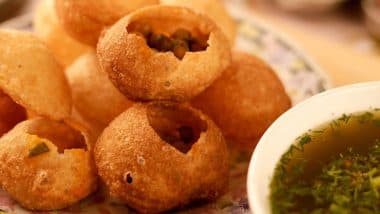Bengaluru, July 1: Food safety officials in Karnataka have discovered cancer-causing chemicals in pani puri samples collected from various locations across the state. According to the Food Safety Department, 22% of the 260 samples tested did not meet safety standards. Among these, 41 samples contained artificial colours and carcinogenic agents.
According to a report published by the Hindustan Times, 18 samples were deemed unfit for human consumption due to their stale state. Commissioner Srinivas K informed Deccan Herald that the department had received numerous complaints regarding the quality of pani puri served on the streets. "We collected samples from roadside stalls to decent restaurants from all over the state. Many samples were found in a stale state and unfit for human consumption," he stated. Artificial Colours Banned for Kebab Preparation in Karnataka: State Health Department Bans Harmful Artificial Colours in Veg and Non-Veg Kebabs, Citing Test Results.
Earlier this year, the Karnataka government banned the use of the food colouring agent Rhodamine-B. Health Minister Dinesh Gundu Rao emphasised that stringent action would be taken against sellers using such chemicals in their establishments. "Food safety in the state is our priority, and we will inspect more dishes to find out what colouring agents are being used in them," Rao said. He also urged the public to be cautious about the food they consume and called on restaurant owners to maintain hygiene standards. "The restaurant owners must also be responsible enough to maintain hygiene. Otherwise, strict action will be taken," he added. Human Finger in Ice Cream, Centipede in Amul Ice Cream, Dead Rat in Hershey's Chocolate Syrup – Scary Viral Videos of Shocking Discoveries in Food.
Rhodamine-B, commonly used in dishes like gobi manchurian and cotton candy, is typically employed as a tracer dye in water to determine flow rates and directions. However, studies have indicated that Rhodamine-B can cause cell death and damage tissues, including the cerebellum, brainstem, kidney, and liver. It is considered a carcinogen and is toxic to the human body.
(The above story first appeared on LatestLY on Jul 01, 2024 08:19 PM IST. For more news and updates on politics, world, sports, entertainment and lifestyle, log on to our website latestly.com).













 Quickly
Quickly


